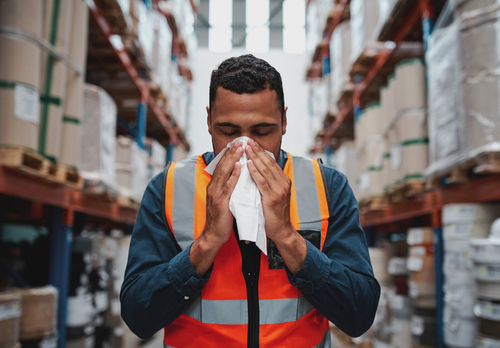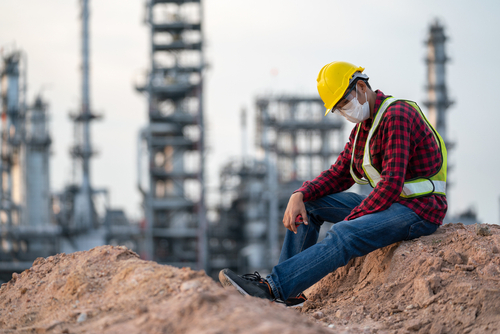The outbreak of the COVID-19 pandemic in 2020 brought unprecedented challenges to the American workforce. As the virus spread, essential workers faced heightened risks of infection in their workplaces, prompting questions about the treatment of COVID-19 cases within the Workers’ Compensation system.
In this article, we will explore how the epidemic changed the processing of Workers’ Compensation claims, the responses of state Departments of Workers’ Compensation, and insurance companies.
Additionally, we will examine how COVID-19 infections contracted at work were acknowledged as work injuries and how they were categorized, as well as the average compensation a proficient workers compensation attorney in Ontario, CA can secure for their clients in these cases.
The Impact of COVID-19 on Workers’ Compensation Claims
The pandemic posed a unique and unprecedented challenge for Workers’ Compensation systems across the United States. Unlike traditional workplace injuries, COVID-19 infections were highly contagious and could be contracted in a wide range of settings. This created uncertainties about whether COVID-19 cases could be considered work-related injuries eligible for compensation.

Recognition of COVID-19 as a Work Injury
State Workers’ Compensation systems and insurance providers began to grapple with the issue of recognizing COVID-19 as a work injury. Key considerations included:
- Occupational Exposure: Determining whether worker’s occupation puts them at a higher risk of COVID-19 exposure was a crucial factor. Healthcare workers, first responders, and essential workers in public-facing roles were often at the forefront of these considerations.
- Causation: Establishing the connection between the workplace and the COVID-19 infection was another challenge. Contact tracing and the timing of exposure in relation to work shifts played a role in making these determinations.
Responses of State Departments of Workers’ Compensation
State Departments of Workers’ Compensation responded to the pandemic with a range of approaches. While guidelines and regulations varied, several common themes emerged:
- Presumption Laws: Some states introduced presumption laws, which automatically presumed that certain essential workers who contracted COVID-19 did so in the course of their employment. This simplified the process of filing Workers’ Compensation claims for these workers.
- Increased Flexibility: Many state departments provided flexibility in terms of evidence and documentation requirements, recognizing the unique challenges posed by COVID-19 cases.
- Claims Handling: State departments and insurance companies adapted their claims handling procedures to address the influx of COVID-19-related claims, streamlining processes to expedite compensation.
Presumption Laws
Presumption laws (SB 1159 in particular) played a significant role in the recognition of COVID-19 as a work injury. These laws varied by state but often included:
- Coverage for Essential Workers: Presumption laws typically covered essential workers in high-risk industries such as healthcare, public safety, and food services.
- Presumption of Causation: These laws created a presumption that if an eligible worker contracted COVID-19, it was presumed to be a work-related injury, shifting the burden of proof to the employer or insurer to demonstrate otherwise.
- Time Limits: Some laws imposed time limits on when the presumed infection must have occurred in relation to the worker’s job duties.
Acknowledging COVID-19 as a Work Injury
Eligibility for Workers’ Compensation benefits due to COVID-19 varied based on various factors, with the key considerations being:
- Occupational Risk: Healthcare workers and first responders were often considered at higher risk due to their direct exposure to COVID-19 patients.
- Exposure Location: Whether the exposure occurred primarily at the workplace, such as a hospital or nursing home, or elsewhere, played a role in determining eligibility.
- Presumption Laws: In states with presumption laws, eligible workers were automatically entitled to Workers’ Compensation benefits for COVID-19 infections.
Categorization of COVID-19 Injuries
Varying levels of severity prompted the need for Coronavirus cases to be classified into varying categories, including:
- Occupational Diseases: Health conditions or illnesses that result from exposure to workplace hazards, including infectious agents like viruses, are referred to as “occupational diseases”, and COVID-19 cases that were recognized as work injuries fell into this category.
- Temporary vs. Permanent Disability: COVID-19 could lead to temporary disability or, in severe cases, result in lasting impairments and even permanent disability. The categorization depended on the duration and severity of the illness.
- Death Benefits: Tragically, some workers succumbed to COVID-19. In such cases, Workers’ Compensation systems provide death benefits to the surviving dependents of the deceased worker.
Average Compensation for COVID-19 Cases
The average compensation for COVID-19 cases in Workers’ Compensation claims varied widely depending on factors such as the severity of the illness, wage replacement rates, and state-specific benefit calculations. In many cases, Workers’ Compensation benefits included:
- Medical Expenses: Coverage for all necessary medical treatments related to COVID-19, including hospitalization, medication, and rehabilitation.
- Temporary Disability Benefits: Compensation for lost wages during the period of recovery, typically calculated as a percentage of the worker’s pre-injury earnings.
- Permanent Disability Benefits: In cases where COVID-19 resulted in lasting impairments, workers could receive permanent disability benefits.

Conclusion and Future Considerations
The recognition of COVID-19 as a work injury required significant adjustments to the existing framework. While State Departments of Workers’ Compensation responded with varied approaches, including presumption laws and increased flexibility, the uniqueness of the situation merits further monitoring and adaptation.
This includes addressing issues of long-term disability and mental health effects, as well as ensuring equitable access to benefits for all affected workers. The experience of the COVID-19 pandemic will likely shape the future of Workers’ Compensation and influence how similar public health crises are handled in the workplace.
Where to find a proficient workers compensation attorney near me in Ontario, CA?
If you have been infected with COVID-19, and you suspect it was contracted at work, do not hesitate to contact California Workers’ Compensation Lawyers. With our track record of success and extensive knowledge of the legal landscape, we’re the prime partner to help you navigate the challenges of the work comp system. Reach out to us today for a free initial consultation via telephone, all video chat platforms, and in-person appointments at our Orange County headquarters. We have a no-win, no-fee policy, which means if we do not win your case, you pay no fees, ever. Remember, the insurance companies have aggressive lawyers, you should too. Call now and get the financial settlement owed to you by the California State Worker’s Compensation system.








